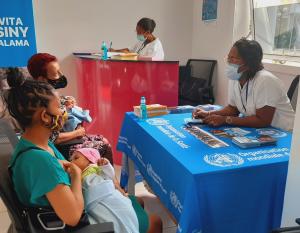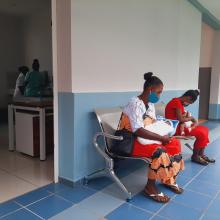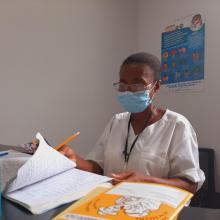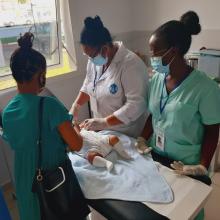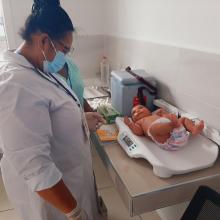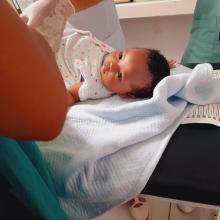Easing Routine Vaccination during COVID-19 in Madagascar
Young Sylvania Randriambelo breastfeeds her 2-month-old baby, as she pays rapt attention to what the senior nurse is telling her at the newly refurbished “Centre Ami de la Vaccination” of the University Teaching Hospital (Centre Hospitalier Universitaire, CHU) Tanambao-Diego, in the Diana Region of Madagascar. The centre is the latest addition to five others, bringing the total number of such centres in the country to six.
Like the other nursing mothers sitting on the waiting bench at the new centre, the 18-year-old has come to vaccinate her little girl, Cham-leng who is scheduled to receive the POLIO 1, Penta 1, Rota 1 and PCV10-1 vaccines. “My child took ill some weeks back and I missed out on her vaccination schedule. Knowing how important these vaccines are for her, I feel relieved I was able to bring her for follow-up today,” the young mother Sylvania explains. The baby had already received the BCG and polio 0 vaccines at birth.
As usual, before the child receives the day’s dose of vaccines, she is undressed for weighing by the assistant nurses in attendance. When the baby is carefully placed on the scale, an air of laughter and small-talk fills the room as the senior nurse commends the young mother for the child’s impressive weight. Little Cham-leng was born at [this] hospital with a birth-weight of 3.6 kg. Today at eight weeks, she weighs an encouraging 5.4 kg.
For the Senior Nurse overseeing the activities at the unit, Ms Isabelle Volafeno the new “Centre Ami de la Vaccination” is a much-welcome addition to the hospital where about 30 women deliver each month.
“It is really a great thing for me because we already have here a maternity ward which receives women coming in from every corner of town for delivery. With this centre, we will directly get into phase 1 of routine vaccinations for their newborn babies without any risk of intermissions and those from the suburbs can take their babies home and only wait to continue the second phase of vaccination.”
Vaccines are one of the most important ways to prevent children from getting some life-threatening diseases. In Madagascar, the current vaccination calendar provides for the administration of a number of vaccines for free, for children from 0 to 18 months. These include BCG for tuberculosis; OPV for polio; DTP-HepB-Hib against diphtheria, tetanus, pertussis, viral hepatitis B, given in combination with Haemophilus influenzae type b vaccine; Rota for rotavirus; PCV-10 for pneumococcal infections including pneumonia, meningitis, etc.; IPV - inactivated polio vaccine; VAR for measles, mumps, rubella and varicella. The administration of Vitamin A in health facilities is also recommended.
For Nurse Isabelle, offering mothers this possibility to follow-up with vaccination right after delivering is just one of the many advantages the newly opened centre has brought.
“Vaccinations for all babies used to be organized once a week here and we would have a huge crowd of mothers. With this centre open each working day, the number of mothers turning up on same day will greatly reduce, and this will also help the hospital reinforce its strategy on reducing the risk of transmitting COVID-19 by reducing crowding within the premises.” Nurse Isabelle who has been working at the pediatrics unit of the hospital since 2012 adds, with visible contentment.
In the world’s fourth largest island, the COVID-19 situation keeps making the headlines. With cases increasing each day and news of a new variant, things haven’t been made any easier for the population and medical staff. As such, continuity of essential health services has been greatly impacted by the raging pandemic and any effort to limit spread, is a leap forward for the men and women working in hospitals. “In spite of the situation, we all need to continue our efforts towards achieving the objectives of the 2021-2030 Immunization Agenda, which is to reach at least 90% of immunization coverage for all antigens at the national level and at least 90% in each district, with a focus on the equity approach and the quality of services," underscores WHO’s Resident Representative, Pr Charlotte Faty Ndiaye.
It is in this light that WHO in collaboration with the Ministry of Public Health continues to work with other partners to scale-up vaccination in very ‘hard-to-reach’ and poor performing areas and setting up such vaccination centres is one of the strategies to cover and catch-up missed vaccination opportunities.



